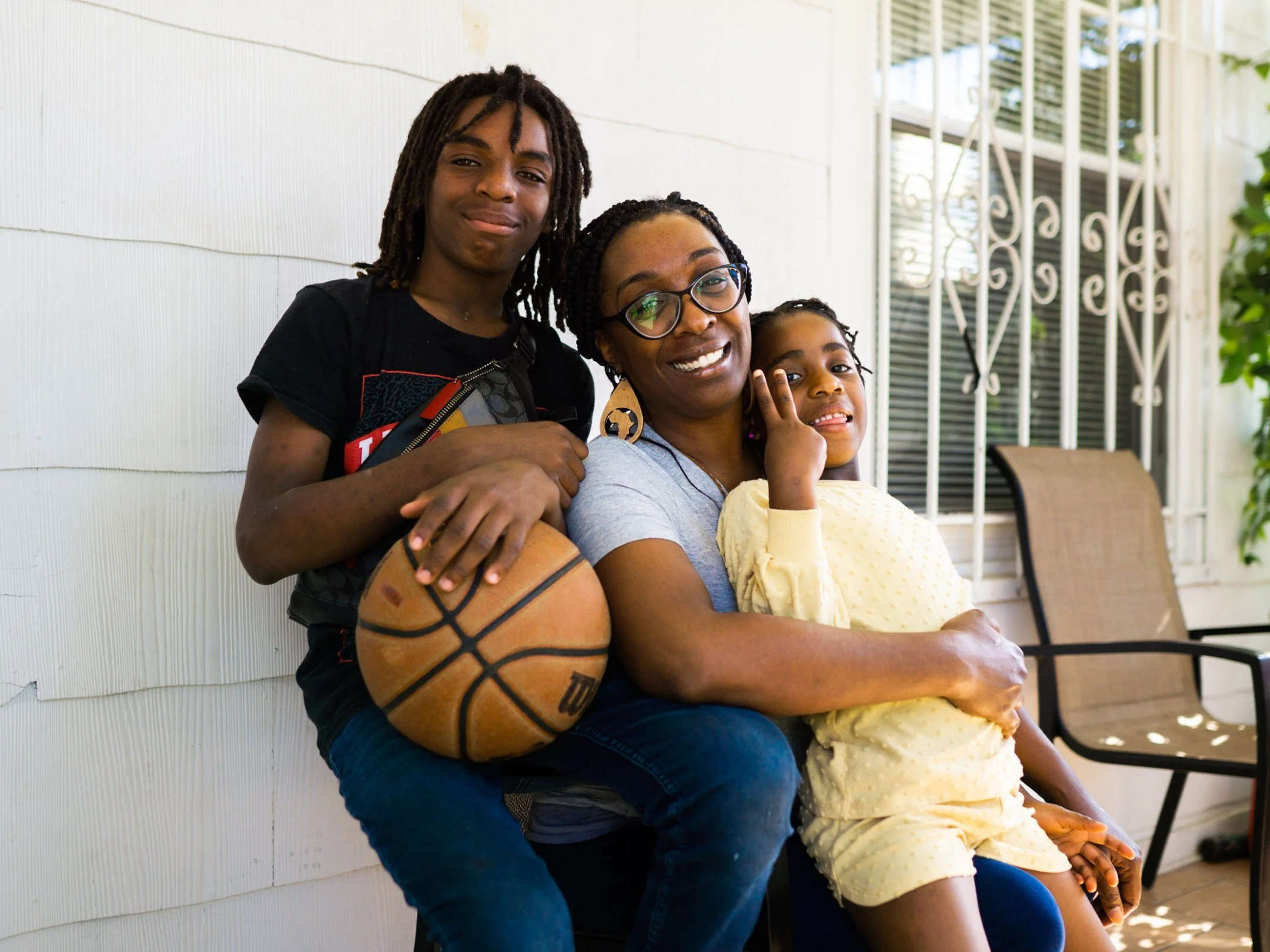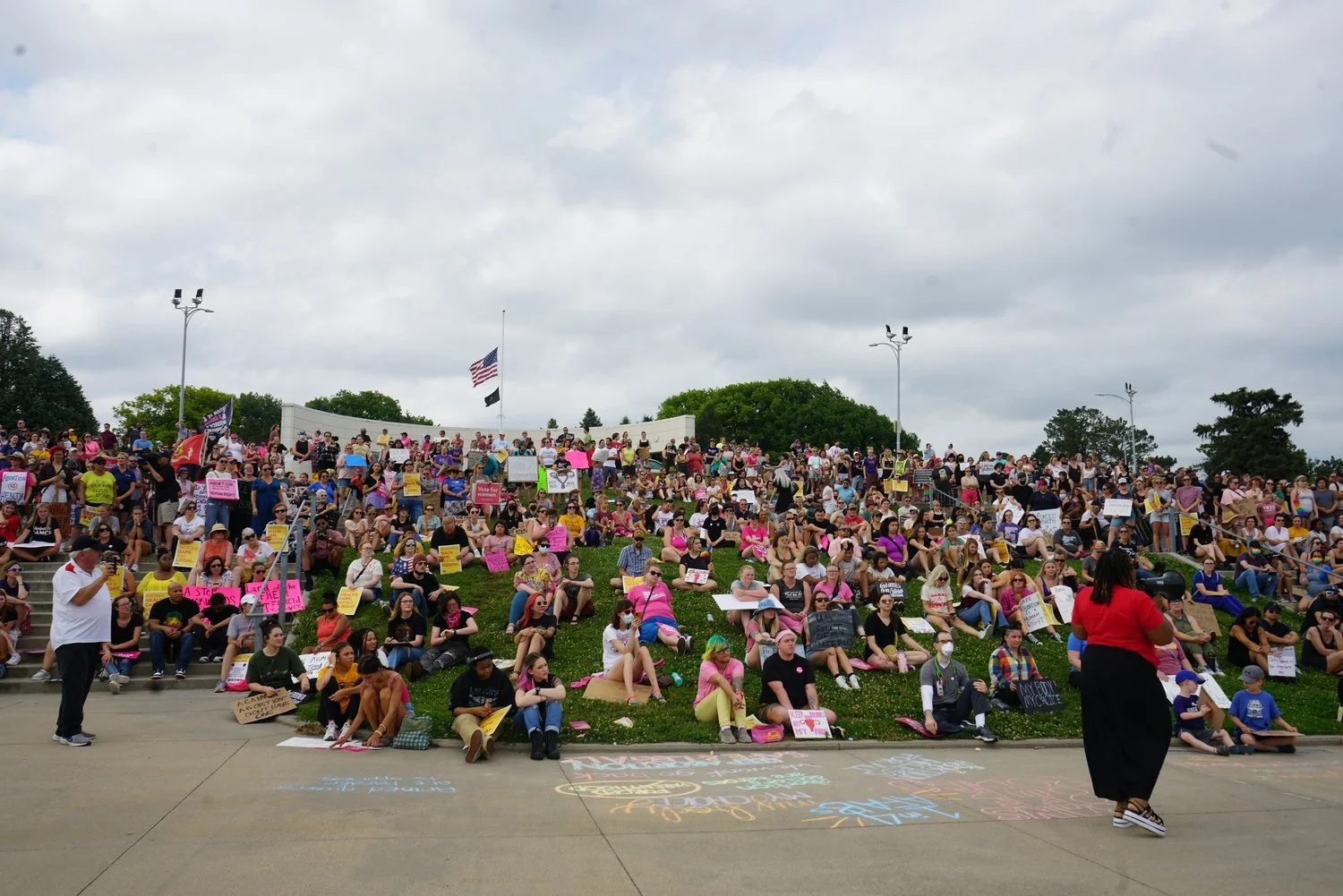Meet the New Executive Director of the Malcolm X Memorial Foundation: JoAnna LeFlore-Ejike
Photo credit: JoAnna LeFlore-Ejike
by Leo Adam Biga
JoAnna LeFlore’s first exposure to the Malcolm X Memorial Foundation (MXMF) occurred at age 12 when she took an African dance workshop. Flash forward a few decades, on Feb. 1, 2022, 34-year-old JoAnna LeFlore-Ejike was named MXMF’s first full-time executive director. She has been a longtime volunteer board member, most recently serving as vice president alongside president Leo Louis II.
“I am a product of North Omaha. Every sense of that phrase ‘it takes a village’ has been my experience,” said LeFlore-Ejike. Leading MXMF represents a chance to serve “the Black community that I love and live in.”
She wants the public to know “There’s a woman in leadership who wants to empower the entire community, the entire village.”
The center at 3448 Evans St.-- one block from Malcolm X’s birth site on Pinkney St.-- was the lifelong passion of founder Rowena Moore who died in 1998.
Rowena Moore. Photo credit: MXMF
LeFlore-Ejike is the first woman at the helm since Moore died. “Rowena Moore did an amazing job keeping her vision alive. Then when she died some members of her family and the board members before me kept it going. That’s because she built relationships and prioritized that. I have to follow in her footsteps first.”
LeFlore-Ejike’s duties at MXMF include overseeing a multi-acre campus with a memorial, visitors center, community vegetable gardens and programs and events commemorating the memory and beliefs of activist Malcolm X, who was born Malcolm Little in 1925 near a historical marker on the site where his home once stood. The center is seeking state support for development projects to complete the educational and cultural vision of Rowena Moore.
“There’s a woman in leadership who wants to empower the entire community, the entire village.”
Prior to this position, she worked for Film Streams, Mode Shift Omaha, the Bemis Center for Contemporary Arts, the Greater Omaha Chamber of Commerce and was assistant editor at The Reader newspaper for nearly two years.
A communications, community engagement and events manager with degrees from the University of Nebraska at Omaha and Bellevue University, LeFlore-Ejike is a self-described “creative” from a family of entrepreneurs who manage their own businesses.
Knowing and appreciating her roots is a longstanding preoccupation.“Even back in middle school there were people in my life who encouraged me to understand my heritage. I was part of the African American History Challenge hosted by 100 Black Men. So early on I was a nerd for Black history, Black studies. My mama [Angela LeFlore] had the Autobiography of Malcolm X readily available to read at home. Her old copy was the first I picked up. She had books by Terry MacMillan, Iyanla Vanzant, Maya (Angelou). I was so exposed to how Black people have celebrated each other through the art of writing.”
She added, “My father [William LeFlore] supported my nerd behavior by coming to my competitions and encouraging me to speak my mind. My father is the kind of person who knows the power of words and how to live a life with courage the way Malcolm did.”
In high school, she wrote for the school newspaper at Omaha Central, where her exploration into identity and heritage was fueled by an African American history class taught by Rod Mullen. “He was the first Black teacher who influenced me,” she said.
At UNO, a Black film class taught by Cynthia Robinson, now chair of the Department of Black Studies, and an African philosophy course taught by Ra Em Kht Maat impacted her. She led a Black student organization which put her in contact with then-multicultural affairs staffer Sharif Liwaru, who happened to be the MXMF president at the time. Seeing her potential, he recruited her to get involved with MXMF. She honed her skill set as a convener and event planner at UNO and the foundation.
Another influencer, cousin LaTrina Parker, preceded her at UNO. “She was the first person I knew that went to college and graduated. She was an active member of Delta Sigma Theta sorority and became a communications professional in higher education. She encouraged me to study journalism and public relations.” She also counts as a mentor Monique Farmer, who was chief communications officer for the Omaha Public Schools before becoming a University of Nebraska-Lincoln instructor.
Marshall Taylor on Facebook
LeFlore-Ejike found a community sanctuary in the Aframerican Bookstore created by the late Marshall Taylor.
“If I wasn't in the UNO Multicultural Affairs office or Black Studies office, I was at the bookstore. I used to hang out in the back study room, where the MXMF board held meetings before the foundation acquired its own building. The rest of my mentorship came through the men and women who helped keep the foundation alive, including Walter Brooks and Nick Johnson.”
Too Many Brushes With Death
The tragic deaths of three people close to her and her own personal health crisis 18 months ago brought home the stark realities facing Black sisters and brothers.
In 2018 her first cousin, Army staff sergeant Kyle LeFlore, was shot and killed while on leave in his hometown of Omaha. He was only 28.
“It was just a couple of weeks after I got engaged and the tragic phone call came at three-something in the morning.”
The following year she mourned the loss of another cousin, James Crawford, who died of leukemia. He, too, was only 28.
“Some years before, my mother's best friend Passionetta Prince (Fitzgerald), who was like an adopted aunt to me, was murdered in a domestic violence incident.”
LeFlore-Ejike said these losses are “examples of how the Black community I love dearly is dying from violence and health issues at an alarmingly high rate,” adding, “It's important for us all to start taking better care of each other and speaking up about it even when it feels uncomfortable.”
In pursuit of her community building career, she said, “I did what a lot of activists do – I burned out.” She added “People wired in this way find something they’re passionate about and then go full throttle in their career or involvement. In the process, they totally neglect themselves because they probably were raised to put themselves last. Not even second or third, but last. That’s a common thing for activists and caregivers.” The lesson learned, she said, is that “putting yourself first is not selfish, it’s survival.”
Her life or death health crisis in 2020 resulted from stress and neglect that only became magnified as she felt the existential weight of the Black Lives Matter movement.
The energy she gave to protests and conversations around injustice depleted her. “I was exhausted. It was really bad.” Finally, a cause for the symptoms she experienced was found: blood clots. “They reached some major organs in my body, including my heart.”
When noninvasive attempts to eliminate the clots failed, open heart surgery became the only option to save her life. She underwent the successful procedure at the University of Nebraska Medical Center. The experience motivated her to do a reset of the self-care journey she’d already begun but let slide in the wake of George Floyd protests and mounting community commitments.
July 24, 2021
Today is my heart anniversary. This time last year I was at the edge of the universe fighting for my life. But with the faith of a mustard seed and the empowering spirit of resilience from those who came before me, I am here and present.
“I think there was a spiritual reason why it happened to me. Sometimes you have to be shocked into living life instead of just residing in a body. It was part of my personal lesson to have more courage to speak up for myself, to stop putting myself last. I’m grateful I survived because I have more work to do.”
Through posts on her blog and Facebook page she shares personal aspects of her own and others’ journeys.
In a July 24, 2021 post, she wrote:
Today is my heart anniversary. This time last year I was at the edge of the universe fighting for my life. But with the faith of a mustard seed and the empowering spirit of resilience from those who came before me, I am here and present.
Self-care and Career
MXMF has filled her community service niche for nearly a decade now.
“As board members we all had a requirement to give tours to the public. I remember giving a tour to somebody who came from overseas specifically to visit the Malcolm X birth site. That hit home for me. It was then I realized, ‘Okay, JoAnna, the work you’re doing impacts people all over the world or it could.’ Talking to people who have a love of or are scholars of Malcolm X and the Black experience gratifies me. I have stored studies, connections, stories and memories, and now is the time to share what I’ve learned with others.”
Malcolm X
Taking the reins now is right, she said, as she’s recovered from that case of burnout. “I started my own life, I got married, I became a mother. I want to keep going, but I’m trying not to burn out and be drained all over again.”
The position gives her the freedom to be who she is. “I can move the way I need to still take care of what’s important for me and really model that idea of self-care and career. I am wired in a way that I have to make sure I am contributing to some sort of long-term improvement.”
In husband Errik Ejike, program supervisor of Creighton University’s Center for Promoting Health and Health Equality, she has a kindred spirit and soulmate. They met at an Urban League of Nebraska Young Professionals meeting. “We both care about the Black community and will continue to contribute our gifts and efforts towards its advancement,” she said. “He is from Texas and I am from Nebraska, but our mission to elevate the universal Black family especially is our ultimate goal. And just like Malcolm, we are not going to feel guilty or apologize for it.”
JoAnna LeFlore-Ejike, Errik Ejike and daughter Erykah
The couple recently became first-time parents to a daughter. For LeFlore-Ejike, caregiving is an inheritance from her grandmother and mother she’s expressed since youth. “I have always been a mother and nurturer. In high school, they called me “Mama Jo,” As I got older I learned to mother my neighbors and friends, extended family and community through my service. But more recently, through this new physical form of mothering, I am filled with gratitude to be chosen for this journey to raise an entire human being from age zero with her father having an equal part in her development. It's my prayer she grows into another powerful being – warrior, listener and nurturer just like her mother.”
LeFlore-Ejike’s own self-care journey began about a decade after she finished college and her community involvement deepened.
“I began to understand the importance of taking care of yourself so that you can be of service to others around you. A common theme for African Americans is that we sacrifice a lot of our well-being to serve other people and sometimes the serving is not even in our own family or loved ones. I think the self-care conversation is especially needed for Black people. I want to be an advocate for that. You can get all the self-care books and resources you want, but you have to create your own personal ritual – whatever that is. For me, it’s finding personal me-time to just be alone or be outside.”
That emphasis on wellness is right in line with Malcolm X’s teachings and practices and with what the foundation advocates.
“Self-education, self-awareness has always been a theme because Malcolm X was that way,” she said. “He spent a lot of time studying, learning and talking to people before he spoke. We have been encouraged either through mentorship or board service to do the same thing. I do have a lot of goals for self-awareness and educational programs to prioritize.”
She feels if Black Americans are to move past systemic barriers they must individually and collectively actualize themselves.
“Malcolm X had a very strong sense of community. Whatever happens in the future the intention around community is always going to be at the top of our approach, our mission, our vision.
“We are being distracted from collective empowerment on multiple fronts and it's time for us to start elevating one another through the training of our minds, physical discipline and accountability. We have so much work to do in regards to collective power, especially in this city.
“We are still struggling with equity in Omaha,” she said. “I know there is good in our community. But the equity issue is a big deal. Malcolm X talked about that all the time. He said why are we talking about integration when we can’t even support ourselves and each other first. Omaha still has a lot of work to do. I’ve been to cities in other states and I’ve witnessed the results of equity.”
Plans for the Future of MXMF
“I do think my involvement over the years aids in my ability to make sound decisions for the organization. There’s a lot of attention around what’s going to happen or should happen at the Malcolm X Foundation, and I’m here for those conversations. I look forward to them. There are regional, national and international audiences we haven’t even tapped into really, including a grassroots Malcolm X movement with different chapters around the country. Malcolm X lived in so many different cities and they all have a historic landmark or site or memorial of some kind. I plan on building relationships with these groups so that they know where Malcolm’s life began and they can contribute to our foundation’s growth.”
Leo Louis, MXMF president, speaks to a crowd in June 2020 at a rally for George Floyd and James Scurlock
One thing she’d like to do is to expand programming around Malcolm X’s birthday (May 19) to the week-long activities she said MXMF once hosted.
Her community engagement background could prove vital in building partners and allies. “One of my natural strengths is connecting with people. Every relationship I’ve built has been with intention and I’ve left every position in a good space. I look forward to reconnecting with past mentors and other people I’ve met along the way.”
If the foundation is to grow its imprint and impact, she knows it will need more support. “There’s an African proverb that says ‘many hands make the work light,’ and that’s important for the next chapter of Malcolm X foundation. Many hands need to be involved with a concerted effort.”
As for the mark she’d like to leave, she said, “I look forward to making sure the organization remains a safe and engaging place for our community to gather and delegate plans of action.” She added, “This organization will be a hub for the same kind of civic, mental and educational training towards self-empowerment that Malcolm had. So although many are focused on physical developments happening in North Omaha and for the overall benefit of the residents of this city, we understand that you can't have a thriving city or neighborhood without having healthy families and individuals to occupy it. We want to focus on the development of the person first. It's only then that we can celebrate each other because we'll see the work ethic and dedication that each individual contributed towards the collective success.”
“The board has always supported me and now I have the opportunity to get more support for this organization to take it to the next chapter. There’s a lot of layers to the next chapter that require more than just me. I’m excited about that.”
Meanwhile, she hopes a bill recently introduced by Nebraska State Sens. Justin Wayne and Terrell McKinney, LB1025, will find support in the Unicameral to allocate millions of dollars in economic recovery funds to the foundation. MXMF president Leo Louis II made his pitch for the support before a legislative committee in Lincoln.
Whether out front as MXMF’s new public face or behind the scenes building coalition and consensus, LeFlore-Ejike has arrived at a place where what’s paramount to her – community, collaboration, caring – coexist side by side.
“I do feel in alignment, and that’s a very rewarding feeling to have.”



















